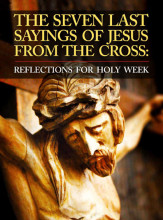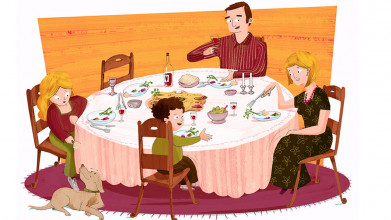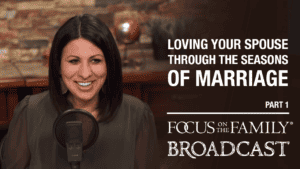
Engaging Hearts and Minds in a Broken Culture
This discussion offers a preview of Volume #16 “Cultures in Conflict” from the That The World May Know video series, available below.
Home » Episodes » Focus on the Family Broadcast » Embracing the Counter-Cultural Message of the Cross
John Fuller: In the gospel of John, Jesus said, I am the Resurrection and the Life. Whoever believes in me, though he die, yet shall he live. That’s good news, the good news, the gospel and we have a message on this Good Friday that looks at the events leading up to Jesus’ resurrection and we’re going to examine what that means in the context of today’s culture. This is Focus on the Family with your host Focus president and author Jim Daly and I’m John Fuller.
Jim Daly: John, there is no greater event in the history of the world than the resurrection of Jesus Christ 2,000 years ago. Everything we do at Focus is based on that truth, that Jesus conquered death and offered life to all of us. It’s changed the course of human history. It gives you and me purpose and direction and billions of other people. I’m honored to have John Stonestreet speak about the cultural thinking today and to juxtapose that with the message of Christ, who is our only hope. John is president of the Chuck Colson Center for Christian Worldview and the co-host of Breakpoint. He spoke recently at Focus on the Family’s chapel and that’s what we’ll be sharing with you today.
John F.: Yeah and John began with some comments about passing our faith on to our children and as Christians, maintaining right thinking about God. So, with that, here’s John Stonestreet on Focus on the Family.
John Stonestreet: It’s great to be the dad of little girls. I got to tell you I was a little idealistic maybe, being a father thinking, you know, particularly, I mean, you know, Jim, you were talking about not losing that’s – all of God and what we try to do with our kids is kind of put that all in them or help them nudge along so that they can see God.
So you just kind of think, as a parent, that the answer is easy, right? You tell them what to think about God and they just believe it and that’s it, right? I mean, and anyone that has kids knows that that’s not the case at all.
I actually learned this quite early when my oldest daughter, Abigail, uh, was only about two or three years old. And my wife was, uh, putting them to bed and – and so she, uh – Abigail, joined her mom as they were putting her little sister Anna, who was, at the time, just one, to bed. And as they were walking out of the room, Abigail leaned in and looked at her little sister and said to her, God will be with you tonight, Anna. God will be with you. Wasn’t that sweet? Except then, she turned around to my wife and she said, Mommy, I told Anna that God would be with her, and the other God will be with me. (Laughter)
My wife told me this story, and I was like, oh no, I work for Chuck Colson and my daughter is a polytheist, right? I mean, where do they come up with these ideas? I mean, listen, just maintaining right ideas about God are – it’s a difficult task enough, for us. A.W. Tozer said that the essence of idolatry is entertaining ideas about God that are not worthy of Him. And so, it’s quite easy to become an idolater, just in our own thinking, but there’s a whole other factor. And it’s that other factor, in light of the events that – that we’re going to celebrate and remember this week that I think – that we want to talk about. The other factor is is that we don’t think thoughts about God in a vacuum.
We think thoughts about God in a cultural context. We think thoughts, not just about God, but about family and about each other, and about marriage, and about morality, and about truth, and all that. But we live in a cultural context, and this culture puts pressure on us, kind of from every side, to shape our thinking in one direction or another. There’s an old Chinese proverb that says, if you want to know what water is, don’t ask the fish. Why wouldn’t you ask the fish? I asked a group of high schoolers that once, and they’re like, I don’t know, ‘cause fish can’t talk. No, that’s not it. The reason you don’t ask the fish, is that the fish don’t know they’re wet. And culture is to us, as water is to fish. We swim in it, and so on. And this pressure, from the culture around us, shapes and impacts and molds and – and nudges our belief about God.
Case in point is this time of year, every single year. Every single year, it’s that time of year, where Christians get together and remember the crucifixion, resurrection of Christ. And culture gets together, and major media and major news outlets get together, and they come up with these “Jesus specials” every single Easter, right? And they tend to do this at every single Christmas as well, but really, at Easter, where, you know, major news publications – who is Jesus? And do we really know who Jesus was? And did Jesus even exist? – and so on.
And I woke up a couple of Sunday mornings ago and I checked my newsfeed before church because that’s always a good idea…and I found that this news network, in order to promote their series on Jesus, had put out a quiz. Some of you may have seen this quiz. The quiz was actually directed at Christians. And the quiz asked this question – how much faith do you have in your knowledge of Christianity? So, it was specifically aimed at Christians in the description and so on, challenging, saying you’re a Christian, do you really know enough about your faith? And so I took the quiz. And in a quiz about your knowledge of Christianity, there was a sum total of one question about Jesus – out of ten, just one. And the question was, where did Jesus walk on the water? There was a sum total of two questions that had anything to do with the Bible, whatsoever. The first was about Jesus walking on the water. The second one was, how old was Methuselah? The other questions were like this: We eat Easter eggs in America, or in the West, to celebrate Easter. What do they eat to celebrate Easter in a random obscure commune in southeast France?
And then another question was, you know, about, you know, what do they hide from me? I mean, it was just these kind of crazy, obscure questions that were geographically-based in obscure expression – now. Here’s the punchline of the quiz. The quiz told you absolutely nothing about how much knowledge you had about Christianity. But it does tell us a lot about how our culture understands religion, in general. And it reveals something about the power, or the influence, of culture. You see, what that quiz showed us is that in our larger culture, religion is not seen as anything having to do with truth.This is one of the deep messages of our culture, and it nudges us. It’s this kind of fundamental idea – and the name for this idea, by the way, is called secularism.
But what secularism says is that religion doesn’t deal with truth; religion deals with faith. Religion doesn’t deal with reason; religion deals with feelings. And it separates these two things as if Christian truth claims aren’t truth claims at all, but that religion is not only personal, it’s private.
If there’s one punchline I want you to get out of today, and as we walk through the events of Holy Week, it’s this – Christianity, and the truth claims that Christianity makes about life in the world, are personal, but they’re not private. The truth claims of Christianity are public truth claims, just like gravity is, the sun is, the solar system is. Christianity says Jesus rose from the dead. And it’s not something that’s true for you and not for me, or true if you believe it. What Christianity claims and what it sets its feet on, is that this Jesus – what happened to Him – is just flat-out true.
It’s in Peter’s sermon on Pentecost. So, this is after the resurrection. This is after Jesus has appeared to them and explained things in the Upper Room. This is after Jesus has ascended and sent down the Holy Spirit. And now Peter is preaching a sermon in Jerusalem where Jesus was crucified, and he gives you a punchline. It’s in verse36 of Acts Chapter 2.The punchline is this. “Let all the house of Israel, therefore, know for certain that God has made him both Lord and Christ, this Jesus, whom you crucified.”Do you see the punchline?
He wasn’t saying Jesus Christ is Lord, if you believe it. He was saying Jesus Christ is just flat-out Lord.I think you can look at each event of Holy Week, starting with Palm Sunday, the Triumphal Entry, going through to what we’re talking about today, Maundy Thursday, the crucifixion and the resurrection. And at each point, each event in Holy Week points to some public truths about Jesus and about Christianity that directly confront some myths that are in our culture today. And I want to walk through each of those four events. Now, I know – here’s one of the temptations. As a Christian, one of our temptations is to rush past Holy Week to get to Sunday, right? You know, that old African-American preacher, you remember that line – Sundays – Friday’s here but Sunday’s a-coming – it’s one of the best things. If you’ve never YouTube this, this go YouTube this. It’s really fantastic. And we want to get to Sunday. Don’t get to Sunday too quick.
The only way to Sunday is through the events of this week. You can’t get to the Resurrection, without going through this. And let’s go through each of these. Let’s start with the Triumphal Entry. One of the things that’s interesting, or one of things that many people have commented about, in terms of the state of our culture today, is what some people have called perpetual adolescence. Perpetual – one of the characteristics of Western culture is perpetual adolescence. Now it’s hard to think this through, but stay with me. Adolescence is not common to the human experience. In fact, in most cultures throughout the history of the world, kids went from being kids to being adults. It’s only in the last 50, 60 years that we added a stage of life called adolescence. And so now, kids go from being kids, to being adolescents to being adults. But what’s being noticed is that kids are entering adolescence at an earlier and earlier stage, and they’re leaving adolescence later, and later and later. There’s names for this. I don’t know if you’ve heard of this – Peter Pan syndrome. My favorite is failure to launch.
(LAUGHTER)
Some of us are thinking of people. Yes, exactly. Right? In fact, the National Academy of Sciences now defines adolescence not as a stage of life between 13 and 18, but as the stage of life between 11 and 30.
Audience: (Murmuring in surprise).
11 and 30. And we could see it almost all the way through our culture. If you ever saw the movie Amazing Grace – anybody see the movie Amazing Grace? Sure. The movie Amazing Grace, you remember, you have these two young parliamentarians – anytime they go out in public, they put on gray hair. Times have changed, right? They want to put on gray hair. There was an idea in their culture that they want to look older, and wider and wiser – and not wider, that’s a different culture.
(LAUGHTER)…Older and – that’s ours. (LAUGHTER)
…Older and wiser, right? In our culture, it’s, you know, let’s put on youth, let’s put on youth. Let’s stay young forever. Let’s stay a teenager, right? The most popular movies in our culture, things like, you know, The Hangover. And all of these movies show these kind of married men acting like Ferris Bueller, right? So, we live in a culture of adolescence. There’s a couple of characteristics of adolescence. One of those characteristics is the characteristics of entitlement, that I’m owed something from the world. And one of the things that I’m owed is the – I’m owed the ability to make the decisions that I want, without any consequences. I want to jump off the roof, but not hit the ground. I want what I want, when I want it, and I don’t want any other kind of side consequences that are undesirable, that necessarily go along with it. That’s one of the characteristics of adolescence. Another characteristic of adolescence is kind of a consumerism. We’re a culture that’s very much addicted to choice.
Descartes said, I think, therefore I am. In our culture you might say, I shop, therefore I am – the ability to choose between infinite options and to always have whatever option that I want on display. You don’t realize how seriously addicted you are to choice, until you find yourself without one.
The other characteristic of adolescence is – is kind of emotionalism – that feelings should trump facts. And you say, what does that have to do with the Triumphal Entry? Well, the Gospel of John tells us that it was when Jesus raised Lazarus from the dead that directly led to the Triumphal Entry. And for the record, Jesus wasn’t the first one to get a Triumphal Entry into Jerusalem.
There was another guy a couple hundred years earlier, named Judas Maccabeus, that had gotten a reception, right? He had beat down the Romans and rebellion and restored worship in Jerusalem. And as he rode in, or walk – came into Jerusalem, they got on both sides of the road with palm branches for Judas Maccabeus. And they said, “Blessed is He who comes in the name of the Lord.” And so they’re thinking the same thoughts that Jesus is going to be that sort of Messiah. Jesus is going to do that sort of thing. And this is the real deal this time, ‘cause he raised somebody from the dead. And it’s those same people who have these expectations – who want life in the world and so on, on their terms. Even the prophecies ofScripture, that just a few days later are saying, “We have no king but Caesar – crucify him, crucify him, crucify him.”
We live in a culture in which we’re told almost all the time that we can have whatever life we want, whatever world we want, that the terms of reality will change on the mere condition that we want them. And even sometimes Christianity, and forms of Christianity, in a kind of a name it, claim it – sort of, if I want it, I get it – and God owes me this, and God owes me that, and that sort of stuff. It’s just deeply ingrained in our culture to think like adolescents. And one of the lessons we learn on Holy Week is – you know what? – the world belongs to God. It belongs to Him. The plans of history are in His hands, not in ours.
The second event of Holy Week is the Last Supper – Maundy Thursday. I remember first telling my kids about Maundy Thursday, and they’re like, what – Monday-Thursday? No, not Monday-Thursday – Maundy Thursday. Maundy comes from that Greek word, or the Latin word, which means “command.” And you know the story. At the Last Supper, Jesus gathers his disciples and He says, “a new command I give to you that you” – what? – “love one another.”
Love’s a tough thing to figure out in our culture, isn’t it? Because, one of the things we’re often told is is that love and truth can’t go together. If we say the truth about something- for example, that marriage has a structure and a definition given by God – if we say the truth about something, then you can’t be loving.
And if you’re loving, you can’t say the truth. And a lot of times these two things are put into conflict. And I’ll just tell you right now, in the work that I do, and even having kids, and so on, I feel the tension between love and truth in our culture – anybody else? Do you just feel like if you speak the truth you can’t be loving? If you’re loving you can’t – and that these two things are always butting heads? This is where Maundy Thursday comes in. See, when Jesus steps up and says, “A new command I give to you” – here’s the irony. He is, at that moment, fulfilling an old command by doing the Passover meal with his disciples. You see theywere to remember the Passover, but now Jesus says, remember, this is my body, broken for you. This is my blood, spilled for you. And – and why is the body broken?Why is the blood spilled? Not because that we’re OK and we just need a friend,not because we just need love from our Heavenly Father – it’s because we need rescue from our sin. This is one of the reasons we have to stay in this week, before getting to Sunday.
There’s no Resurrection without Crucifixion. It matters. And in that act, when Jesus says, now instead of remembering the rescue of Israel at the Passover from Egypt, remember the rescue of sinners from sin and death, and my death and my resurrection. And this is my body, and this is my blood. He says, here’s how you’re to remember it. Love one another. And this is what it looks like. He got up, got the basin, got the towel, got down on his knees and washed their feet. If we think love and truth are in conflict with one another, I get it. It feels that way in our culture. Here’s the good news. Jesus is love. Jesus is truth. If there’s a conflict between love and truth, it’s in our minds, not in reality. He is the source of both of those things, and at that Last Supper, He embodies that connection. And we’re going to remember that together here in just a minute.
Then, of course, there’s the Crucifixion. The crucifixion – I mean, what can we say? There’s so many things that we can say that the Crucifixion confronts. I think one of the most obvious things that the Crucifixion confronts is this idea in our culture that we’re OK. This is one of the most unpopular things about Christianity. Christianity, in our culture, does not say that your feelings are correct on the mere condition that you feel them. We say things in our culture like, every opinion counts. The Bible doesn’t understand that, that every opinion counts. Maybe – yes, every person counts. But some opinions are wrong. Some opinions are dangerous. Some opinions are in conflict with reality itself. The Bible makes no bones about this. You’re not OK. I’m not OK.
The best we can do is as filthy rags. Now you say, how can that be kind? How can that be loving? It’s easy. The cruelest thing you can say to someone who’s not OK is that they are. The cruelest thing you can say to someone, who is under the wrath of God is that they’re not. The cruelest thing that you can tell someone who’s broken is that they’re whole.
The Resurrection – I know we’re not supposed to do this yet. But let’s do it, right? Sunday’s comin’, right? He has risen–.
Audience: –He’s risen, indeed.
John S.: He’s risen, indeed. Isn’t that good news?If you go through all the different political or philosophical systems of the world, what we might call worldviews – all the different worldviews that are out there, all the different belief systems – you can pretty much categorize them into those that are optimistic and those that are pessimistic. The optimistic ones are those that will look at reality, and the human condition and say, you know what? We’re not that bad. We can pull ourselves up by our own bootstraps.
For example, you might say that the 20th century, the 1900s, was the age of utopian visions – one utopian vision after another one saying, we’re gonna fix the world. We’re gonna fix the world. We’re gonna fix the world. We’re gonna rid the world of poverty. We’re gonna rid the world of disease. We’re gonna rid the world of this, or that or the other. How did those philosophies work out? Not really well, did it? Not well at all. In fact, not only didn’t not one of those utopian fantasies fix the world. Almost all of the utopian fantasies of the 20th century made the world a worse place, a more cruel place. More people died at the hands of ideology in the 20th century than all the previous centuries of the world combined. Just one failure after another. If there’s one thing we should learn from the 20th century, it’s that the next time somebody gets up and goes, hey, guys, I figured it out. I got it. I can fix the world – run, because he’s going to bring a lot of hardship and a lot of trouble. But you have philosophies that are optimistic. You have some that are kind of big and grandiose, like those utopian visions, or you just have, kind of the everyday ones that – that tell people they’re OK.
My favorite is Oprahism. I’ll just call it Oprahism – is that OK? It’s kind of a new-agey sort of philosophy that says you’re OK and I’m OK, and if you focus on the good stuff and just ignore the bad stuff, all will be well and you’ll get good parking spots at Christmas and, you know, things like that, alright?
So you have a whole set of philosophies and religions that – that are optimistic about the world, or optimistic about the human condition. You’ve got a whole ‘nother set that are really pessimistic. Life’s broken – kind of the darker forms of what’s called postmodernism falls into this category. No one knows anything for sure, so everyone is just – it’s like all of reality is just one power struggle after another after another. You see this in a lot of kind of alt culture sorts of things- that everything’s broken, everything stinks, and so the only thing to do is just party hard until you die, or just kind of live a life of despair.
The events of Holy Week culminating in the resurrection of Jesus Christ keep us from being an optimist or a pessimist. Why? Well, you can’t be an optimist about the human condition if in order to fix the human condition God had to die. On a Friday afternoon outside of Jerusalem, it can truly be said that God died. God, who took on flesh, entered the world of brokenness and died. That’s the worst thing that could ever happen in the history of the world. That’s the ultimate innocent victim that was victimized because of us.
So, we can’t be an optimist about the human condition, but, you know, you can’t be a pessimist about the human condition, either – why? – because death didn’t win. The day that Christ died, ultimately became the day that death died. It’s funny ‘cause Peter comes to the same conclusion. Years later, as he’s writing his epistle to a group of Christians, the same Peter that preached that Jesus Christ is Lord, and that’s the truth of reality. He actually, in his letters to the church that was about to experience persecution – it’s the first epistle of Peter – you can actually go in there and read that – what do you find? Peter says that where we are to land – what all of this means for us living in this culture – is that we can neither be an optimist or a pessimist. He puts us right in the middle. And the word that he gives us is hope. Just like the Book of Joy was written by Paul from a prison, the Book of Hope was written by Peter in a time facing Nero’s persecution.
And what Peter says is, that there is an event that happened in the history of the world, and the thing that now ought to characterize the Church of Jesus Christ is hope – not wishful thinking, not hope for a new political candidate, or hope for a new situation, or hope for a new tax bracket – hope in the fact that Christ is risen from the dead. And like Peter, like believers throughout history, you and I are to face our cultural moment, plant our feet firmly on the resurrection of Jesus Christ and be people defined by hope.
So the Supreme Court goes our way or doesn’t go our way – here’s what we say together – Christ is risen, right? ISIS continues to wreak havoc on our brothers and sisters in other parts of the world. We say together – Christ is risen. The economy goes up, the economy goes down. We say together – Christ is risen
Thank you, Father, for these events this week. And as we remember them with millions of Christians across the globe, millions of Christians around this country, millions of Christians throughout history, the saints that have gone before us, the angels and the archangels, and the 24 elders, and the living creatures, and everyone else that remembers and – and proclaims the reality and centrality that Christ is risen from the dead. Ground us in that as we look at this crazy world in which we live – in the crazy situations that we face in front of us. And we’re thankful for Jesus Christ, your Son, our Savior above all. In his name, amen. (Applause)
John F.: That’s John Stonestreet speaking at one of our monthly chapels here at Focus on the Family.
Jim: Well, John is such a gifted communicator and I appreciate what he’s done to be a champion in our culture. He’s a wonderful voice for the cause of Christ. As he says, all ideas in the culture have consequences and we need to get our bearings from the cross of Christ, the central event in all of history. To recap, he said the culture pushes us toward making ourselves the center of the universe and that’s not the case. We tend to, as human beings, make our feelings our reality as we adopt those ungodly perceptions like entitlement, consumerism, and emotionalism. I’d say materialism as well. And what should change all of our thinking? Well, it’s the way Jesus taught and lived; to love one another, to speak truth and to always remember his death and resurrection. That should change how we behave. When we share Christ’s love and truth with others, we will contribute to the culture and help to heal some of the brokenness around us.
John F.: And that’s what we’re trying to do here at Focus on the Family. To proclaim that love and that truth and to see the impacts of those in the culture. Now, stop by our website and get a free audio download of this Easter message from John Stonestreet. It’s there at the website and has additional content that we couldn’t fit into this broadcast. The website is focusonthefamily.com/radio. While you’re there, look for the e-booklet. It’s “Coming Home: An Invitation to Join God’s Family” and that has details about becoming a Christian and growing in your Christian faith. Again, focusonthefamily.com/radio.
Well, have a great Easter celebration and join us on Monday. We’re going to be talking with Phil and Kay Robertson of Duck Dynasty about hunting for hope and happiness.
Teaser:
Phil Robertson: You can be born again and so the change that took place all those years ago, 43 years ago, the change that took place is literally stunning.
End of Teaser

John Stonestreet is President of The Chuck Colson Center for Christian Worldview which seeks to build and resource a movement of Christians committed to living and defending the Christian worldview. The Center was begun by Chuck Colson in 1991 as a radio broadcast called BreakPoint, of which John now serves as host. John is a highly regarded public speaker and cultural commentator, and the co-author of five books including A Practical Guide to Culture and Restoring All Things. He and his wife, Sarah, have four children and reside in Colorado Springs, Colo.

There's no place like home, right? Just as home brings a sense of belonging, rest, and security, so does a personal relationship with Jesus Christ. If you don't have one, this booklet can show you how to find your place in God's eternal family and a life of joy and fulfillment you've never known before.

Visit our online store and purchase a CD of today's program for yourself or to share with a friend.

We are often too quick to rush past the Triumphal Entry and the events of Good Friday to Resurrection Sunday. But the only way to Sunday is through, not around, the week before.

The Easter story can be confusing to young children. Use the things popular culture associates with Easter today to teach kids about the real meaning of Easter.

Bring the Easter story to life for your kids through one amazing download and four easy-to-use, age-appropriate activities.

Focus on the Family® is here to help you and your loved ones #ThriveAtHome.

Though you may be social distancing or "quarantined" at home, you and your spouse can still celebrate Easter in meaningful ways.

Love is a sacrifice. We should treat our spouse as someone of great value and care for their needs. But sacrifice should be motivated by love, not fear.

I had learned that Jesus died on the cross, was buried and rose from the dead on Easter morn. But the real-life event had happened so long ago, I didn't see any connection to my life nearly two thousand years later.

How can I uphold the truth of God's Word without coming across as "judgmental"?


This discussion offers a preview of Volume #16 “Cultures in Conflict” from the That The World May Know video series, available below.

Debra Fileta will help couples better understand the four seasons of healthy relationships, what to expect during each one, and how to carefully navigate them for a stronger marriage. (Part 1 of 2)

Debra Fileta will help couples better understand the four seasons of healthy relationships, what to expect during each one, and how to carefully navigate them for a stronger marriage. (Part 1 of 2)

Larnelle Harris shares stories about how God redeemed the dysfunctional past of his parents, the many African-American teachers who sacrificed their time and energy to give young men like himself a better future, and how his faithfulness to godly principles gave him greater opportunities and career success than anything else.

Amy Carroll shares how her perfectionism led to her being discontent in her marriage for over a decade, how she learned to find value in who Christ is, not in what she does, and practical ways everyone can accept the messiness of marriage and of life.

Jonathan McKee offers parents practical advice and encouragement in a discussion based on his book If I Had a Parenting Do Over: 7 Vital Changes I’d Make.